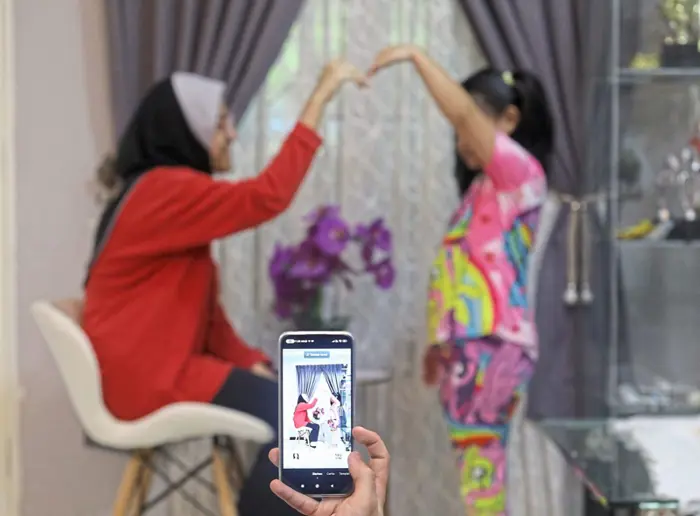ANN/THE STAR – In the digital age, where our lives are meticulously curated for public consumption, an unsettling trend has taken root, i.e. social media influencers using their own children as content.
This practice is becoming increasingly common in Malaysia as parents turn their offspring into miniature celebrities, often without considering the long-term psychological impact.
At first glance, it seems like harmless videos of children giggling, playing or sharing innocent moments of joy, and in some cases, grief as well.
But beneath the surface lies a complex and troubling reality.
These children, too young to consent, are having their lives broadcast to an audience of strangers, their privacy irrevocably compromised.
The price? A potential minefield of mental health challenges that may only manifest years down the line.
Commodifying your child
For many influencer parents, the rationale is simple. Their children are part of their lives, so it feels natural to include them in their online journey. But in reality, these children are not merely “included”; they are commodified.
Their faces, emotions and private milestones are monetised, and their vulnerabilities laid bare for engagement, views and brand deals.
A child’s first steps, their first day at school, their moments of sadness, their tantrums – these are experiences meant to be lived, not exploited for likes.
Yet, influencer culture has turned parenthood into performance, where even a child’s distress can be reshaped into “relatable content”.
The impact of such exposure is not always immediate, but there is a great likelihood that children who grow up in environments where privacy is non-existent may face significant mental health consequences.
Too young for consent
These children are too young to understand what it means to have their lives documented online.
They have no say in whether or not they want their image to be used, and by the time they are old enough to object, the damage may already be done.
Their childhood moments – some embarrassing, some deeply personal – are permanently etched on the internet.
Children raised in the digital spotlight may struggle with self-identity. Their sense of self becomes intertwined with how they are perceived online. They may develop an obsessive concern about their appearance, their behaviour, and whether they are “liked” – both literally and figuratively.
Some influencer parents inadvertently turn their children into marketing tools. When a child becomes the central figure in sponsored content, they are no longer just a child, but a brand asset.
Unhealthy exposure
Even if a child is not actively engaging with social media, seeing their image online can lead to unhealthy comparisons.
This can lead to feelings of inadequacy, anxiety or depression, especially if their social media image does not align with their real-life experience.
Once a child’s image is exposed on social media, the threat of cyberbullying is ever-present.
In this digital era, it is easier for individuals, including other children or adults, to engage in harmful behaviour.
Children may become targets of hurtful comments or malicious content that can severely damage their self-esteem and mental well-being.
Oversharing can make children vulnerable to exploitation, including identity theft, and even more sinister threats like online predators.

Lack of protection
Some parents argue that featuring their children online can be beneficial; that it provides financial stability, opportunities, and even a sense of community.
But at what cost? We have seen countless young stars from traditional media struggle with the effects of childhood fame, such as anxiety, depression, trust issues and struggles with identity.
The rise of “kidfluencers” suggests that we are merely repeating history, this time under the guise of “family content”.
Unlike traditional child actors, who have legal protections in many countries to safeguard their earnings and limit their exposure, children in influencer families are often unprotected.
Their right to privacy
All parents, influencers or otherwise, need to pause and reflect. Your child is not a product, nor a performance.
They are human beings who deserve privacy, dignity and a chance to develop away from the pressures of public scrutiny.
As adults, we choose to participate in the digital space. Our children, however, do not.
They deserve the right to enter the online world on their own terms, when they are old enough to understand the implications.
Policymakers must recognise the urgency of this issue and introduce legal frameworks to protect children from digital exploitation. At the same time, social media platforms need to step up by enforcing stricter guidelines on child-centric content.
But ultimately, the responsibility lies with parents. The choice to expose or protect a child online rests in their hands.
Childhood is too precious to be content. It should be a time of exploration, wonder and growth – not one spent under the relentless gaze of a camera lens.
Social media is an undeniably powerful tool, but it should never come at the cost of a child’s well-being.
So, to every parent with a following, a platform, or even just a smartphone – let your child be a child. Let them play, make mistakes and grow away from the pressures of an online audience.
In the end, no amount of likes, shares or sponsorships will ever be worth the cost of their mental health and privacy.


